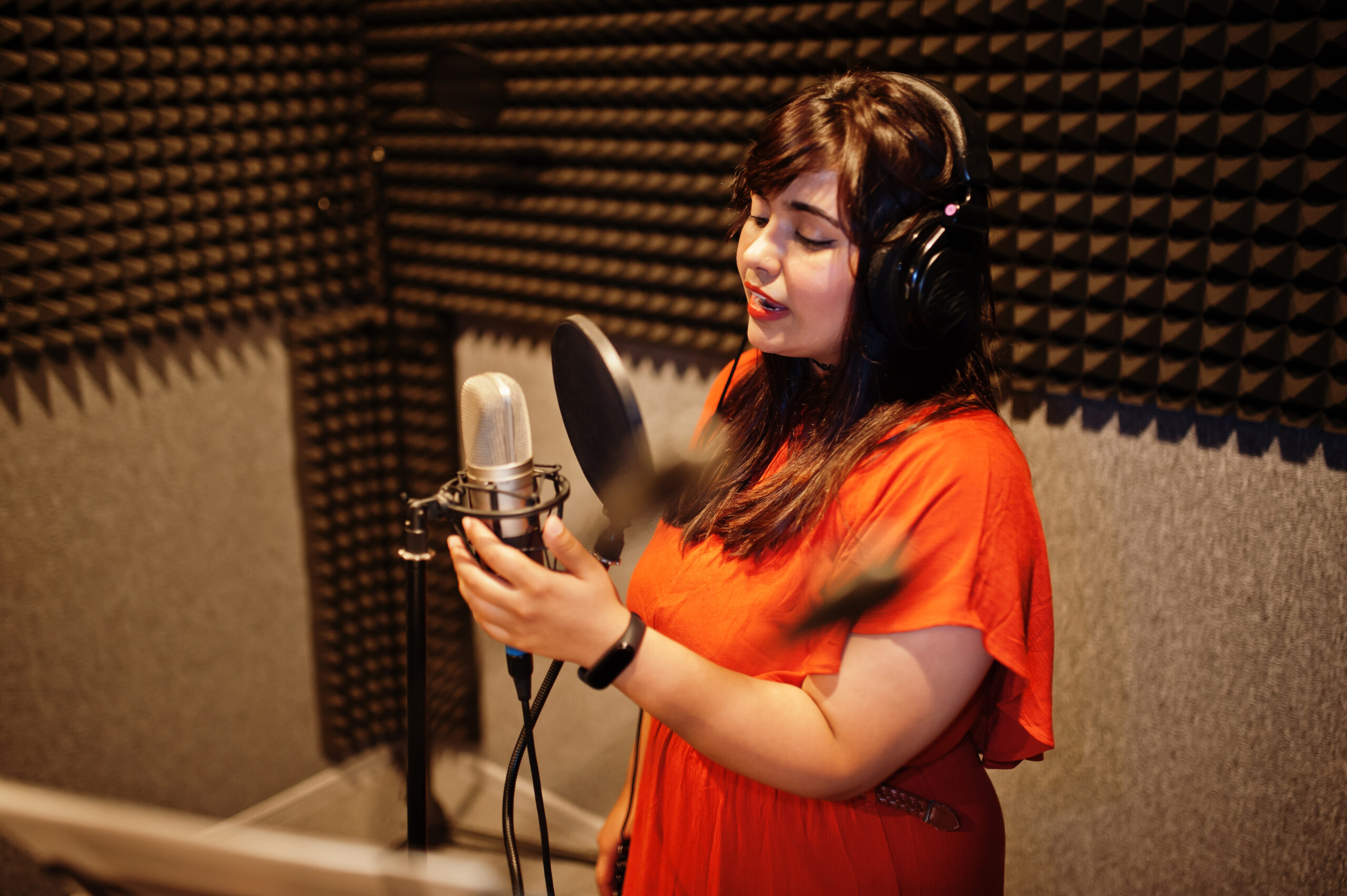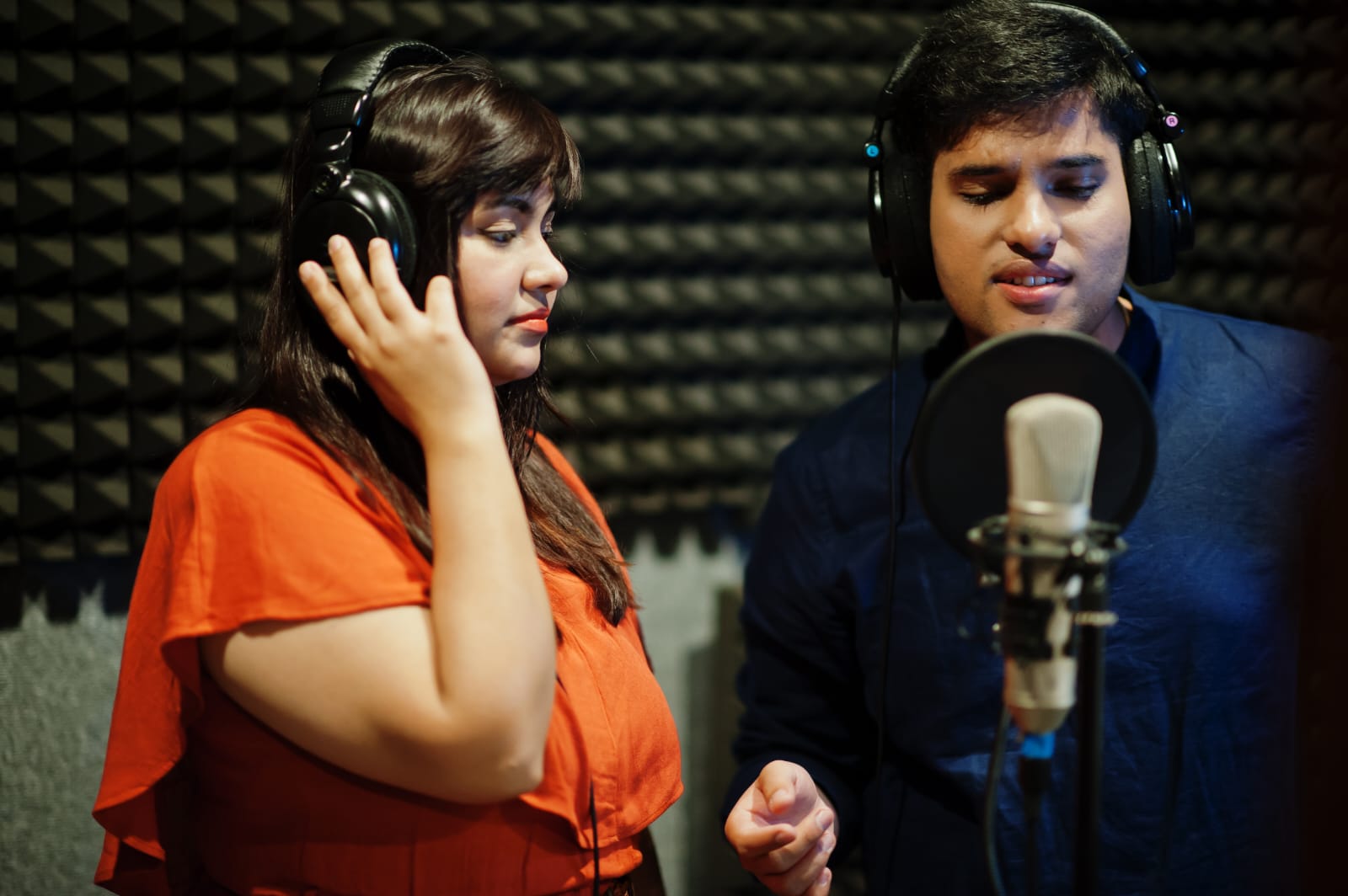To begin with, the voice is an artist’s most paramount tool, for instance, the artist who wants to become a playback singer, a rapper, a classical music performer, or a pop singer. Unlike in the case of guitars or keyboards, you can’t toss it or fix it with some glue in a jiffy. Thus, you need to take care of your voice from the very beginning – starting with vocal warm-ups.
At Maa Records, we have worked with singers from all genres, and one unifying factor across all success stories is disciplined vocal preparation. In this blog, we will discuss why warm-ups are crucial for your voice and share some excellent warm-up exercises applicable across various genres.

Affordable Sound Studio In Punjab
Why Is It Important to Warm Up Your Voice
1. To Prevent Voice Damage
The vocal cords are muscles. Just as athletes warm up before a game so that they will not get injured, singers too ought to prepare the vocal cords for a hard and long usage. Warm-ups increase the blood flow to the vocal folds and reduce tension, hence preventing long-time damages like nodules, hoarseness, or vocal fatigue.
2. Enhance Range and Flexibility
Warm-ups, upon use for a long time, improve the range of the voice. With some loosening of these muscles, one can easily sustain higher notes or lower notes without any strain. Flexibility, in turn, is a necessity when singing dynamic genres such as R&B, Bollywood, or opera.
3. Increased Control and Precision
Warm-up exercises work on strengthening aspects such as breath control, pitch, and articulation. It is a must-have in genres where quicknote-flow, runs, and complicated melodic passages are far common: for instance, Indian classical music and western pop.
4. Increases Artist’s Confidence and Performance Quality
After being warmed up, there would be a sense of confidence emanating from within each artist. In a recording studio, rehearsal stage, or any place of presentation, he will be less susceptible to cracking voice or missing a note, or worse, singing off-key.
Vocal Warm-Ups (By Genre)
A vocal warm-up should go hand-in-hand with the stylistic requirements of the given genre. Let’s look at how some warm-up exercises differ from one musical style to another:
1. Indian Classical (Hindustani/Carnatic)
Breath control, the exactness in microtonal intervals (shruti), and vocal stamina are of major importance here.
Recommended Warm-Ups:
- Sargam Patterns (Sa Re Ga Ma): Keep it slow and then slowly increase the tempo.
- Aakar Singing: Use the “aa” vowel throughout your scale for better vowel projection.
- Kharaj Practice (lower octave): For the purpose of gaining volume and resonance.
- Taan Practice: Rhythmic short phrases practice agility and note jumps.
- Tip from Maa Records: Always start with a tanpura or harmonium drone to stay pitch-perfect.
2. Bollywood/Playback Singing
This category is extremely vast- because it requires anything from soft romantic tones to highly energetic dance numbers and heart-breaking ballads.
Recommended Warm-Ups:
- Lip Trills (Motorboat sound): Excellent for working on air support and breath control.
- Sirens (sliding from low notes to high): Helps in opening up the vocal range.
- Humming: To foster resonance and vocal focus.
- Semi-Occluded Vocal Tract Exercises (SOVT): Such as Straw Phonation to lessen vocal strain.
- Tip from Maa Records: Work on the transition of vowels and blending of registers (chest to head voice).
3. Pop and R&B
A smooth tone, quick runs, falsetto, and a genuine emotional connect are needed for these styles.
Recommended Warm-Ups:
- Scale Slides on “oo” and “ee”: For tone clarity.
- Melisma Training (Runs & Riffs): Run through 4–5 note runs slowly with precision.
- Breath Support Workout: Short panting followed by holding notes.
- Tip from Maa Records: Practice singing alongside the backing tracks at varied tempos to improve agility on the voice.
4. Rock & Indie
Rock vocals can also be characterized by false growls, power-growls, and quivering voices. Thus, improper use can cause damage to the fisique.
Recommended Warm-Ups:
- Chest Voice: Sustain an “ah” sound mid-range with power, but never tension.
- Humming into the resonance mask (front of the face): This aids projection and tone.
- Yawning Stretch: This stretches out the throat.
- Anytime they can never force distortion of a voice-Acquire safe techniques or seek a vocal teacher.
5. Hip-Hop and Rap
Rapping needs pronunciation, breath control, rhythms, and stamina, unlike singing conventionally.
Recommended Warm-Ups:
- Tongue Twisters: Speed drills such as “Betty bought a bit of butter” augment clarity.
- Rhythmic Flow: Use a metronome to practice rhymed verses.
- Breath Control: Try to speak a long line at one breath to build up lung strength.
- Tip from Maa Records: Stay hydrated–throat gets dry faster while rapping than while singing.
How Long Should You Warm Up?
- Minimum time: 10 to 15 minutes before recording or performing
- Extended prep: 20 to 30 minutes in case of lead-ups for heavy vocal sessions or high-note material
- Always start off with very light warm-ups and gradually get onto expansions or louder phrases.
Quick Tips for Effective Warm-Ups
- Hydration is knack; warm water is most apt.
- Avoid dairy or cold beverages before singing.
- Every day is a warm-up day; don’t limit it to performance days only.
- Stand in front of the mirror and watch if there is tension in your posture or jaw.
- Keep records of your warm-up improvements.
How Maa Records Supports Vocalists
- At Maa Records, we take it further than being merely a label; we:
- Provide studio vocal coaching through recording sessions
- Render genre-specific guidance for playback, devotional, indie, or fusion artists
- Train with warm-up exercises for beginner and experienced vocalists
- Conduct workshops and voice-care sessions with vocal experts
So, whether on the way to a recording or gig or a devotional tribute video, we’ve got you and your voice all set to perform at its best.
Final Thoughts
Great singers aren’t just born—they’re built through discipline, technique, and care. Warming up isn’t just a formality. It’s the key to unlocking your best voice, protecting it for the future, and delivering unforgettable performances.
At Maa Records, we support artists across genres—from Indian classical to hip-hop—helping them sound their best in the studio and on stage. Start treating your warm-ups like your most important rehearsal, and you’ll see the results in every note you sing.


No Responses